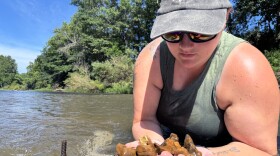
Celia Llopis-Jepsen
Reporter, Harvest Public MediaI'm the creator and host of the environmental podcast Up From Dust. I write about how the world is transforming around us, from topsoil loss and invasive species to climate change. My goal is to explain why these stories matter to the Midwest and Great Plains, and to report on the farmers, ranchers, scientists and other engaged people working to make the region more resilient.
I previously covered environment and other beats for the Kansas News Service.
I have a master's in journalism from Columbia University and a master’s in bilingualism studies from Stockholm University in Sweden. Before coming to Kansas, I spent a decade living and working in Sweden, Germany and Taiwan, including several cherished years working for the Taipei Times.
Email me at celia@kcur.org.
-
A Texas pecan farmer spent years rethinking whether he needed so many chemicals to grow food. He cut back on things like weedkillers, but when it came to ditching insecticides, crop pests posed a challenge. That’s what brought him together with a famous bat scientist — who helped him build an insect-eating army of bats.
-
Restoring woodlands and protecting undeveloped areas near the Blue River and its creeks are a few of the steps that could mitigate pollution and flooding.
-
Astronomers need your help! And you don’t have to be an expert, because it’s as easy as stepping outside your home and taking a good look at a constellation like Orion. For 20 years, the citizen science project Globe At Night has helped advance our understanding of light pollution – as scientists figure out how fast stars are disappearing from our sky.
-
More people participating in the citizen science project Globe At Night could help fill gaps in what astronomers know about the extent of skyglow.
-
The Prairie Band Potawatomi Nation is one of the first hemp fiber processors in Kansas, and wants the investment to benefit both the tribe and the environment. The new products include insulation and compostable cutlery.
-
The Prairie Band Potawatomi Nation’s agriculture business grows hemp without irrigation, insecticides or plowing. Now its product is helping to build a home in Ogden.
-
As we embark on our third year of Up From Dust, we discuss why we started an environmental podcast in the Midwest — and what we’ve learned along the way. In 2026, stay tuned for stories about farmers, astronomers, turtles, bats and more. We’ll overcome fears and rethink how we grow food and build our cities. And we’ll meet the people in the Heartland who tackle the challenge of climate change with determination and resolve. Thanks for coming along with us.
-
This past semester, Kansas State University relaunched the nuclear engineering major that it discontinued in 1996. It has already attracted more than 50 students.
-
In one long-polluted Ozark river, the little fish darting through the water and the rare mussels hiding on the pebbly bottom tell a story worth celebrating. They’re signs that the Spring River is benefitting from environmental cleanups after a century of mining pollution. A professor and his students are uncovering the evidence of recovery. But there’s a twist: They’ve also found a new environmental challenge unfolding farther upstream.
-
The fish and rare mussels hiding in the Spring River that flows through Kansas and Missouri are signs that environmental cleanups are helping river wildlife recover from a century of mining pollution.







